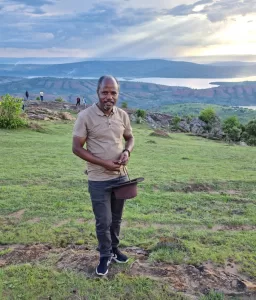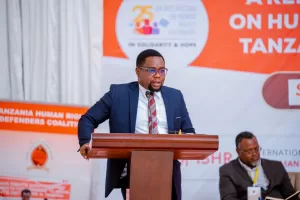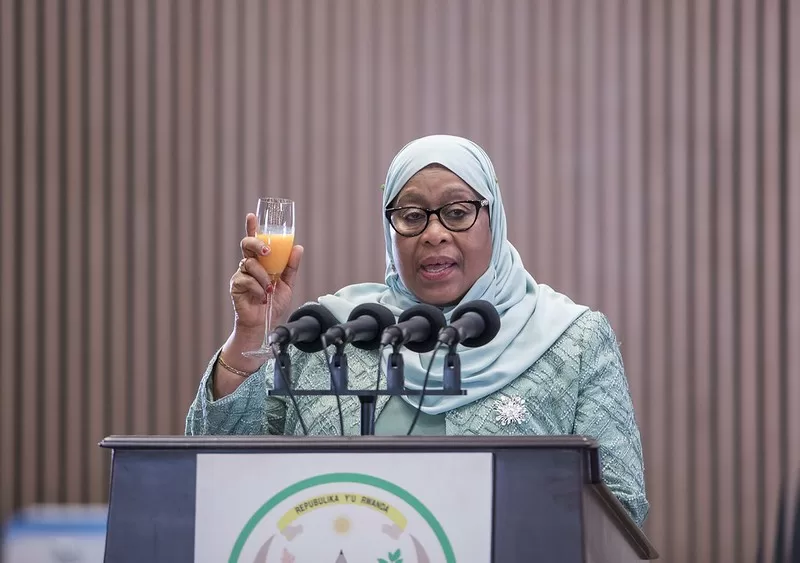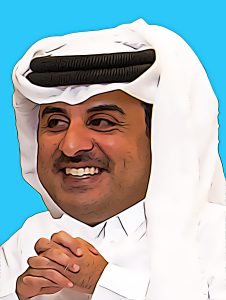Index relies entirely on the support of donors and readers to do its work.
Help us keep amplifying censored voices today.
Atar, a digital magazine distributed via email and WhatsApp, first came to my attention late last October. I was in a dimly lit New York cafe, warmed by the company of a group of Sudanese diaspora; artists, activists, journalists, nursing hot teas and wounded souls. As it often does, the question of obtaining high quality Sudani news bubbled up. “Have you heard about Atar yet?’ someone asked. I hadn’t, yet. But this interaction was instructive. With their formal website still under construction, word-of-mouth was one of the main ways this weekly Arabic (bi-monthly English) magazine was being found.
An initiative of the non-for-profit Sudan Facts Center for Journalism Services – founded by veteran journalist Arif Elsaui – Atar began publishing on 12 October 2023, six months into the war against civilians in Sudan. Co-managing director Amar Jamal told Index it was a project borne of necessity.
“We had been talking about theory for a long time,” Jamal said. “But with the current situation, we realised there won’t be any more media outlets in Sudan left.”
Sudan Facts Center had been running fellowships for young professional journalists, but the crisis spurred them into pushing forward with their greater ambitions. “If we were going to wait until the perfect conditions, we would be waiting a long time. Let us start, and improve as we go along,” Jamal noted.
Since October, the Atar team has produced 28 Arabic editions and four in English. Inspired by The Continent, another popular African digital news magazine, Atar – with the tagline “Sudan in Perspective” – is currently distributed through Telegram, WhatsApp, Signal and email.
“There hasn’t been a day when our distribution list hasn’t grown,” Jamal said.
Stories range from investigations into “Sudan’s labyrinth of torture centres” to the stories of those fleeing the war north through Egypt. Early editions reported on the daily experiences of Sudanese people during the conflict, how they “eat, drink and sleep” and their “daily heroism”, while more recent releases focus on the mutual aid infrastructure keeping people alive.
Not only was the content of the story important to get right, Jamal said, but the voice and tone of the publication was given thorough consideration.
“We stay away from tragic language. While we are writing about death, we write about it with heroism.” Not necessarily out of a desire to give readers hope, “but to give people an encouraging word”.
Atar began with three editors in Nairobi – Arif Elsaui, Amar Jamal and Mohammed Alsadiq – and four correspondents. The first releases were focused on the written word, delivering vital information via dense blocks of text, not unlike the traditional Sudanese newspaper. But this model changed after the team took stock 10 weeks into the project. Over the new year period, “we took a break to review the structure and design, expand our pool of reporters, institutionalise the project so it wouldn’t fail,” Amar said.
Today, Atar is delivered by 24 reporters and seven editors. The growth is palpable, not only in the range of stories, but in their design. The structure and voice of Atar is unique, deliberately so. “This is not a newspaper, delivering daily stories,” Amar makes clear. Atar is focused on analysis, curation, about showing the verification and the context for your average reader to make sense of unfolding events.
“The need for a newspaper has changed in the age of social media,” said Jamal, noting that in an age of camera phones, the recording of events has been democratised.
“What is needed now is the verification and context. That is our ambition. Respecting the intellect of the Sudanese reader, and presenting material that yes, might be difficult, but it has value. The value it has is in its truth.”
Atar is providing a home for fact-based news in a prohibitive information landscape. There are few players in Sudan today, fewer still after the state suspended operations of three satellite channels this April, Saudi state-owned broadcasters Al Arabiya and Al Hadath and UAE-owned Sky News Arabia.
“All of the correspondents that we began with have had to leave the country,” Amar admitted. “It’s very difficult to write from the inside.” But difficult is not impossible, and Atar consistently manages to publish original stories from the ground.
“Sometimes, stories are written under the Atar byline to protect the journalist,” Jamal said, describing how their local correspondents find ways to contact sources and file stories even in the most challenging circumstances. “Even when the internet was cut off,” he said. “You just adjust your investigative style.”
Atar’s popularity now means that they are regularly approached by writers, reporters and potential sources as an outlet for news, with some sending in fully written pieces for publication. Atar pride themselves on having an open-door policy, allowing anyone to submit material via phone or email, but only work that goes through their fact-checking system will be included in the magazine. The volume of engagement and interest is a “scream from the people,” Jamal said. Even a 14-year-old girl sent a piece with some news. These are people’s voices who are not heard and Atar wants to be a home for them.
Such grounded local reporting cultivates intense loyalty and support, such as in the case of the small island of Dagarti. “It has maybe only 300, 400 inhabitants,” Jamal said. “Nobody had written about these people before. But when our journalist went to do a follow-up story, she said the whole island waits for Thursday so they can read Atar.”
What next for Atar? The team has big ambitions. Their English-language edition was always part of the plan, because “it isn’t just the Sudanese reader that cares about Sudan.” They have recently moved into a new, larger office in Nairobi, with talk of a live studio arm, events and more. Their approach is experimental, and with enough funding in the bank for the moment, Jamal is excited about the future.
Jamal is not the only one. If this is what the Sudanese people can do in the most inhospitable of circumstances, imagine the possibilities once the war is over.
When Tanzania’s President John Magufuli died in 2021, at the height of the Covid-19 pandemic, many hoped for an end to his six years of autocratic rule which saw the country’s civic space all but disappear. After Samia Hassan succeeded him, she assured the country that his authoritarian practices had died with him. Yet a crackdown on opposition to a lucrative new deal to run Dar es Salaam’s port in perpetuity and restrictions on the use of virtual private networks (VPNs) suggests otherwise.
In her inaugural policy speech after Magufuli’s death, President Hassan said: “I have heard there are media that were banned. Reopen them, we should not give them room to say we are shrinking press freedom. We should not ban the media by force. Reopen them, and we should ensure they follow the rules.”

Tanzanian journalist Ansbert Ngurumo fled to Sweden in 2017
One of those who heard Hassan’s promises was the Tanzanian journalist Ansbert Ngurumo (left), who had fled Tanzania in 2017 after getting tipped off that hitmen with orders from Magufuli to kill him had checked into the hotel where he was staying.
Speaking to Index from exile in Sweden, he said: “Journalism became a crime under Magufuli”
The omens looked good after Magufuli’s death. After being sworn into office, President Hassan, the newly celebrated “champion” of freedom of expression, seemed to act promptly on her promises. Human rights organisations, who had had their bank accounts frozen, were once again able to regain access. Onesmo Olengurumwa, director of the Human Rights Defenders Coalition of Tanzania, saw the accounts of his organisation released shortly after her announcement.
Media Council Tanzania reported a decrease in cases of arrests and harassment against journalists. It recorded 18 violations in 2022, down from 25 in 2021 and 41 in 2020. In January 2023, Hassan lifted a ban on opposition party rallies.
Yet Ngurumo says Hassan’s speech was disingenuous. “She was insisting that she was the champion of freedom of expression and free speech, whilst in the same breath putting barriers and limits to those same freedoms. Her freedom of expression is ’you scratch my back, I’ll scratch yours’ That is not freedom of expression.”
The early optimism which followed Hassan’s rise to power was short-lived. Although the number of reported cases against journalists has decreased since Magufuli’s death, suspensions, arrests, and harassment remain commonplace.
In fact, the ghost of Magufuli still hangs over civic space in Tanzania and journalists still feel the weight of the legislation passed and enforced during Magufuli’s presidency. Laws like the 2015 Cybercrimes Act, the 2016 Media Act, and the 2018 Online Content Regulations continue to restrict freedom of expression, and create an environment of fear and self-censorship.
According to Ngurumo, “Magufuli had instilled a sense of brutality in the state organs. That spirit of brutality didn’t die with him.”
More recently, Tanzanian authorities have arrested over 20 activists protesting the most recent deal to manage Dar Es Salaam’s largest port, according to Human Rights Watch. The authorities later arrested three lawyers for holding press conferences on the port deal. Boniface Mwabukusi, Willibrod Slaa and Mdude Nyagali were held on allegations of treason before being released four days later.
The controversial deal will see Dubai Port World, a UAE-based logistics company, take over the management of Tanzania’s largest port in Dar Es Salaam. Critics are concerned by the nature of the deal, which sees DP World gain the right to manage the ports in perpetuity, whilst restricting Tanzania’s ability to change conditions of the contract.
Opposition to the DP deal has been stamped out of Tanzanian media. This most recent crackdown puts Hassan’s promises in a questionable light. Old authoritarian practices have quickly come back to haunt Tanzania at the first real threat to Hassan’s leadership.
For Ngurumo, this was just another sinister message to journalists and activists in Tanzania: “These guys were held but they were released. You see, they are just threats to remind them that the government can still do something.”
Those threats seem to be working. Under constant fear and pressure, mainstream Tanzanian media still shies away from criticising the government.

Onesmo Olengurumwa of the Human Rights Defenders Coalition of Tanzania feels that opponents to a deal for Dubai Ports World to take over Dar Es Salaam’s port fear speaking out
Olengurumwa (right) argues that publications “have that hangover and feel like they will be treated as they were under Magufuli if they speak up. So they choose to remain silent, especially the mainstream media”.
From Sweden, Ngurumo still regularly writes about Tanzanian politics in his online newspaper Sauti Kubwa which means “loud voice” in Swahili. He knows that his colleagues in the country do not have the luxury of distance.
“Right now, I don’t see media in Tanzania doing their job. I do not blame them because the laws are still very repressive.”
Ngurumo still believes there is a way out: “If one thing should be done it should be amending the existing laws. We are only afraid of the laws. If we had the right laws, we would just do our job.”
Tanzania’s civic space might be at the mercy of the fickle “goodwill” of their new President, but human rights activists like Ngurumo and Olengurumwa are working hard to restore freedom of expression in their country.
Ngurumo still advocates for engagement with the government from exile. “There is back and forth. We don’t want to have to wait until there is another president.”
In their eyes, change can only happen through engagement with the government and community empowerment. Both are part of organisations pushing for the amendment of the Magufuli laws. Olengurumwa added that “if people can see that our constitution is changing and that laws are being revised, then that will also give them the confidence in our civic space.”
Their fight to reclaim civic space after decades of authoritarianism will be hard fought. On 13 October 2023, the Tanzanian Communication Regulatory Authority issued a statement restricting the use of virtual private networks in the country, much to the dismay of human rights organisations.
In their statement, the Tanzania Digital Rights Coalition condemned the move and argued that it corresponded to “curbing freedom of expression and restricting access to unbiased information.”
It seems authoritarian habits die hard. But if President Hassan is serious about her intentions to restore civic space in Tanzania, it is only by breaking down repressive legislation and building the protection of freedom of expression into the constitution that old ghosts can finally be laid to rest.

Tanzania’s president Samia Suluhu Hassan in 2021. Photo: Paul Kagame, CC BY-NC-ND 2.0 DEED
Contents
 The atrocious worker conditions and contempt for basic human rights in Qatar have certainly been on our minds over the last year. However, relatively little attention has been paid to the man pulling the strings.
The atrocious worker conditions and contempt for basic human rights in Qatar have certainly been on our minds over the last year. However, relatively little attention has been paid to the man pulling the strings.
“Al Thani holds a relatively lower profile than his counterparts in Saudi Arabia and the UAE, but his dedication to censorship is no less concerning. From concealing thousands of workers’ deaths due to poor working conditions to arresting both local and international journalists, Al Thani remains committed to curtailing freedom of expression at every level,” says Emma Sandvik Ling, partnerships and fundraising manager at Index on Censorship.
Tamim bin Hamad Al Thani became emir in Qatar in 2013. Since then, he has demonstrated a commitment to censoring dissident voices. Qatar boasts widespread censorship in the press, academia, and civil society. Blatant cases of censorship are certainly not hard to come by: In 2021, blogger Malcolm Bidali was arrested and spent 28 days in solitary confinement for writing critically about the Qatari royal family. Indigenous groups are excluded from participating in Shura Council elections. In November, two Norwegian journalists were arrested hours before a scheduled interview with Abdullah Ibhais, the former communications director for Qatar’s 2022 World Cup.
Like his regional counterparts, Al Thani has invested in soft power strategies to appease international critics. Index editor-in-chief Jemimah Steinfeld reflected on the 2022 World Cup in Qatar in the autumn edition of the Index on Censorship magazine: “Here’s a nation that prohibits homosexuality, has no free press, forbids protest, restricts free speech. It has stadiums built using migrant labour with little to no workers’ rights. And yet come November these stadiums will open to the world, international dignitaries will be wined and dined and Qatar will revel in the glory associated with hosting a World Cup.”
Global attention will likely move on to new issues and challenges after the World Cup final on 18 December. Still, Al-Thani’s oppressive regime will remain.